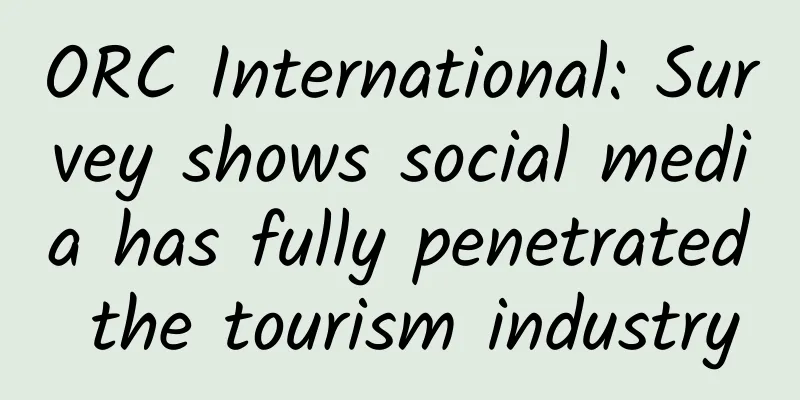ORC International: Survey shows social media has fully penetrated the tourism industry

|
Accor's second social media monitoring in Asia Pacific shows that today's travelers spend almost as much time online finding information, making plans and sharing their travel experiences as they do relaxing on the beach or exploring new destinations. The survey found that 70% of travelers in Asia Pacific use social media when traveling, with travelers in China (84%), Vietnam (83%) and Indonesia (82%) being the most active. Travelers from Australia, New Zealand and Japan are the least active users of social media, but even so, two in five people in these countries still frequently use social media while traveling. Travelers in the Asia-Pacific region spend an average of 2.8 hours per day on social media, with travelers in Indonesia, Malaysia and Thailand spending around 4 hours per day. Accor and ORC International conducted this survey, interviewing more than 6,500 travelers from 13 countries, aiming to find the most popular websites and social media platforms for guests in the Asia-Pacific region. As the largest hotel management group in the region with 590 hotels in 17 countries in the Asia-Pacific region, Accor has a unique advantage to comprehensively analyze travelers' social media usage habits. Through this survey, Accor learned when and on which platforms guests usually prefer to search for travel-related information, make reservations or share travel experiences, so as to serve travelers more targeted. Jens Uwe Parkitny, Vice President Digital Marketing and Distribution at AccorHotels, said: “AccorHotels’ latest Social Media Monitoring Survey shows that social media has fully penetrated the travel industry. This survey provides us with a good understanding of the preferences of guests, including how they seek travel inspiration, how they use social media to interact with the outside world during their stay, and how they share their experiences after their trip.” “We can use this valuable information to better meet the needs of our guests at every stage of their travel journey. At the same time, by tracking the development and changes in people’s social media behavior on an annual basis, AccorHotels can better optimize its social media development strategy in Asia Pacific.” The survey results show that Facebook is still the most popular social media platform for travelers, followed by WhatsApp, but instant messaging platforms originating from Asia have become increasingly popular in the past year, with WeChat's popularity rising by 13% and Line rising by 11%. In some markets, these instant messaging platforms have even begun to surpass Facebook to become the primary social network for sharing travel-related information. The survey also found that the market landscape of social media is changing rapidly, with multiple media such as Youtube and Instagram becoming more and more popular, with 23% of travelers using Youtube multiple times a day and 11% using Instagram multiple times a day. WhatsApp is highly accepted in the Asia-Pacific region (33%), surpassing Facebook in four markets: Hong Kong, Malaysia, Singapore and India. For the first time this year, Line surpassed Facebook to become the most frequently used social media in Thailand, becoming the first choice for 71% of Thai respondents. In Indonesia (33%) and Japan (26%), Line also ranks among the top three most popular social media in these regions. Surprisingly, in mainland China, WeChat has replaced Sina Weibo as the most popular social media, with three out of four travelers saying they use WeChat multiple times a day. In Hong Kong, WeChat also ranks among the top three. Emilie Couton, Accor's Vice President of Customer Experience, said: "The survey results enable Accor to communicate more effectively with its customers. For example, Accor recently held a lucky price promotion in Thailand using Line's platform, which attracted more than 20,000 participants in just three days. Accor also launched its own WeChat public account in China and quickly attracted more than 9,000 participants through the "Book Future Memories" event, which helped promote its newly launched website accorhotels.cn." Nearly half of the respondents said they use Facebook multiple times a day (including in China), while only 13% said they never use the social media platform. Women are more likely to use Facebook, with 54% of women saying they use it multiple times a day, compared to 45% of men. In the Asia-Pacific region, the Philippines has the highest rate of Facebook use, up 13 percentage points from last year (73% use Facebook multiple times a day). Comparing countries, the differences are also significant. In Australia, New Zealand, Indonesia, Japan, the Philippines, Thailand and Vietnam, Facebook tops the list for all three stages of travel (before, during and after the trip). In Singapore, Malaysia and India, people prefer Facebook for pre-trip information and post-trip experience sharing, and use WhatsApp more to stay connected during the trip. In South Korea, the situation is exactly the same, except that they use KakaoTalk instead of WhatsApp. In Hong Kong, people prefer to use Facebook for pre-trip research and planning, but are more likely to use WhatsApp to share experiences during and after the trip. In mainland China, the situation is similar, with people preferring Sina Weibo to find information but more willing to share experiences on WeChat. |
>>: What Real-Time Marketing Means for B2B
Recommend
The food we eat during the Spring Festival is too greasy. Can these foods "strip away the greasiness"? It's time to know the truth...
This article was reviewed by Li Lin, PhD in Food ...
The latest research results of "Tsinghua Bamboo Slips" show that there was a "three-dimensional space" view of the universe during the Warring States Period?
Can you imagine that more than 2,000 years ago, o...
The efficacy and function of cowgrass
When talking about cowroot grass, many people don...
High blood pressure ≠ hypertension! Stay away from high blood pressure and do these 6 things
Speaking of high blood pressure Many people feel ...
Talking about Snakes in the Year of the Snake | “Human greed is like a snake swallowing an elephant”, why can a snake’s mouth open so wide?
The idiom "Human greed is like a snake swall...
The efficacy and function of Bindweed
There are many types of common Chinese medicinal ...
What are the ways to eat Panax notoginseng seedlings?
There are many ways to eat Panax notoginseng seed...
If you have these "three pains and one swelling", your kidneys may be in danger! Don't do these four things!
References [1] Quan Meihua. How to scientifically...
With the rush to promote new technologies, has the mobile phone industry become "involutionary"?
Competition in the mobile phone industry is becom...
What are the effects and functions of Angelica and Astragalus and how to eat them?
Although the current living standards are constan...
Lunar exploration "power decoding"! Which engines were used in the Chang'e 6 exploration mission?
On July 12, 2024, Wu Baoyuan, a researcher at the...
Xiangsha Liujun Pills
There are many medicines in our lives that we nee...
Popular Science Comic | What is "Carbon Finance"? What does it have to do with us?
Source: Fujian Finance, National Joint Center for...
If one cubic centimeter of neutron star matter comes to Earth, will it burn up in the atmosphere or smash through the Earth?
This article is based on answering similar questi...
The efficacy and function of Zoumafeng
Rhizoma Zouma is a famous traditional and commonl...









